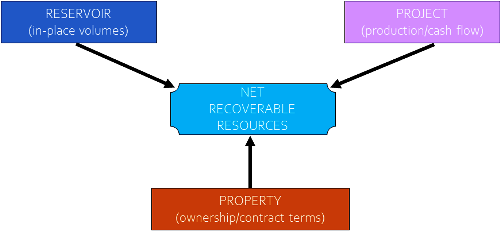Course Details
Home / Public Courses / Course Details
ONLINE: Reserves and Resources - Assessment and Assurance (PBM932)
Description
This course investigates the classification and categorisation of resources within both the SEC and the PRMS systems. Using case studies, the course rigorously studies the boundaries between class and category when assessing resources for management and financial disclosure.
The methodology for assessing hydrocarbons-in-place and resources is explained and the significance of uncertainty is described. Both deterministic and probabilistic approaches to volumetric assessment are outlined, and sufficient statistics is introduced to understand both the Parametric and Monte-Carlo methods for combining distributions.
The engineering toolkit, using static, decline curve, material balance and reservoir simulation, is described. Practical exercises and illustrations of the pitfalls and issues in resource categorisation are illustrated by examples.
Course Structure: 5 modules of 3 hours each, delivered over 5 days
Each day will consist of 1 module which will be no more than 3 hours in length with multiple breaks.
Course Level: Skill
Duration: 5 days
Instructor: Pete Smith
The methodology for assessing hydrocarbons-in-place and resources is explained and the significance of uncertainty is described. Both deterministic and probabilistic approaches to volumetric assessment are outlined, and sufficient statistics is introduced to understand both the Parametric and Monte-Carlo methods for combining distributions.
The engineering toolkit, using static, decline curve, material balance and reservoir simulation, is described. Practical exercises and illustrations of the pitfalls and issues in resource categorisation are illustrated by examples.
Course Structure: 5 modules of 3 hours each, delivered over 5 days
Each day will consist of 1 module which will be no more than 3 hours in length with multiple breaks.
Course Level: Skill
Duration: 5 days
Instructor: Pete Smith

Designed for you, if you are...
- A reservoir, petroleum or drilling engineer or geoscientist working in multi-discipline teams
How we build your confidence
This is a five-session online course with worked examples, case studies, exercises, and discussions.The benefits from attending
This course presents advanced techniques for reserve estimation and addresses the difference in classification and categorisation of resources and reserves.By the end of the course participants will feel confident in:
- Distinguishing reserves and resources by definition and guidelines for their application from various regulatory and industry authorities, including PRMS (Petroleum Resource Management System) and the US Securities and Exchange Commission (SEC) protocols
- Discovering the latest and most accurate methods for estimating reserves, both deterministic and probabilistic, and gain a thorough understanding of various reserves levels and their equivalence in both systems, including proved, proved plus probable, and proved plus probable plus possible
- Assessing the volumetric derivation of resources, both deterministically and probabilistically
- Evaluating uncertainties for projects at different stages of the E&P lifecycle
- Formulating problems probabilistically and systematically assess risks & uncertainties
- Developing decision trees to lay-out the logic of the decision, evaluate the robustness of the decision and competently use the provided software
- Validating data using statistical distributions and combine them using both parametric and Monte-Carlo methods
- Evaluating the impact of correlations between variables in resource estimation exercises
- Understanding the various methods in the resource estimation toolkit
- Appraising the limitations of resource assessment methods
- Selecting the appropriate estimation tool given the maturity of the project and the level of uncertainty
- Assuring resource assessments by integrating the relationship between volumes, development plans and economics
- Evaluating the different categories of reserves and resources
Topics
- Introduction
- Primary resource estimation methods
- Value - measuring project value
- Making decisions
- Statistics and distributions
- Estimating probabilities and ranges
- Bayesian revision
- Finding a deterministic value that best represents a distribution
- Correlations and dependent variables
- Importance
- Value of information
- Alpha field group exercise - risks and opportunities
- Estimation tools - analogues
- Estimation tools - volumetric derivation of hydrocarbons in-place
- Assessment of recovery factor (RF)
- Risk and uncertainty in resource estimation
- Volumetric uncertainty
- Alpha field group exercise - volumetric estimation
- Estimation tools - decline curves
- Estimation tools - material balance
- Commercial considerations
- Case studies
- Alpha field group exercise - assessing value
- Estimation tools - numerical simulation
- Resource reporting
- Commercial implications
- Resource booking approach
- Other reporting systems
- Alpha field group exercise - resource and reserve reporting
© All rights reserved
HOT Engineering GmbH Tel: +43 3842 43 0 53-0 Fax +43 3842 43 0 53-1 hot@hoteng.com
